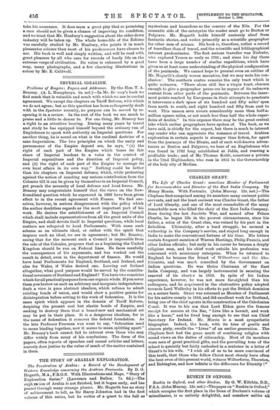IMPERIAL IDEALISM.
Problems of Empire: Papers and Addresses. By the Hon. T. A. Brassey. (A. L. Humphreys. 62. net.)—In Mr. Br-ssey's book we find much that is valuable and much with which we are in cordial agreement. We except the chapters on Tariff Reform, with which we do not agree; but as this question has been so frequently dealt with in the Spectator recently, no purpose can be served by re- opening it in a review. In the rest of the book we see much to praise and a little to demur to. For one thing, Mr. Brassey has a right to an attentive hearing. During many years by travel and study he has equipped himself beyond the ordinary run of Englishmen to speak with authority on Imperial questions. For another thing, he is sound on what is the cardinal doctrine of a sane Imperialism. The two principles on which the unity and permanence of the Empire depend are, he says, "(I) the right of each part of the Empire which bears its fair share of Imperial burdens to a voice in the control of Imperial expenditure and the direction of Imperial policy, and (2) the right of each part of the Empire to manage its own local affairs in its own way." Nothing could be better than his chapters on Imperial defence, which, while protesting against the notion of exacting any serious contribution from the Colonies till it can be given by themselves in an Imperial Council, yet preach the necessity of local defence and local forces. Mr. Brassey may congratulate himself that the views on the New- foundland question which he expressed in 1892 have been given effect to in the recent agreement with France. We find our- selves, however, in serious disagreement with the policy which the author doubtless regards as the most important part of his work. He desires the establishment of an Imperial Council which shall include representatives from all the great units of the Empire, and shall devote itself to Imperial questions, while local matters are relegated to local Parliaments. With some such scheme as an ultimate ideal, or rather with the spirit that inspires such an ideal, we are in agreement; but Mr. Brassey, seeing that for the moment such a Council is impossible from the side of the Colonies, proposes that as a beginning the United Kingdom should be run on Federal lines. He faces manfully the consequences of his arguments, and has worked out the result in detail, even in the department of finance. He would have local Parliaments for England, Scotland, and Ireland, and also for Wales, if Wales desired one. Leaving out Ireland altogether, what good purpose would be served by the constitu- tional severance of Scotland and England ? You have two countries which for all practical purposes form one organic whole. If you sever them you bestow on each an arbitrary and inorganic independence. Such a view is pure abstract idealism, which refuses to admit existing bonds of union, and would show a positive genius for disintegration before setting to the work of federation. It is the same spirit which appears in the domain of Tariff Reform, despising the present real but elastic bonds of Empire, and seeking to destroy them that a brand-new and mechanical set may be put in their place. It is a dangerous idealism, for in the name of federation it removes the federal foundation. As the late Professor Freeman was wont to say, "federation used to mean binding together, now it seems to mean splitting apart." Mr. Brassey's book cannot fail to interest even those who may differ widely from many of his conclusions. The form of the papers, often reports of speeches and casual articles and letters, scarcely does justice to the value of much of the matter contained in them.






















































 Previous page
Previous page